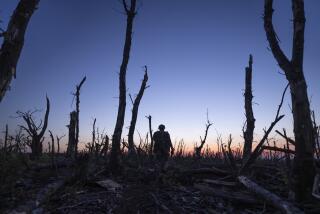Raining on Putin’s parade: Why so many no-shows for WWII celebration?
Friends and foes have snubbed Saturday’s Red Square military parade, a dent in Russians’ pride over their World War II sacrifice and President Vladimir Putin’s reputation for throwing blowout parties.
Here’s why, little more than a year after Putin’s spectacular Winter Olympics bash, world leaders don’t want to be seen with him, even to celebrate the glorious defeat of Nazi Germany 70 years ago.
U.S. and European officials decided months ago to boycott the garish display of military might in protest of Kremlin aggression in Ukraine. Eight of Russia’s 14 former Soviet sister states are reportedly no-shows, signaling their dismay over Putin’s claim of his nation’s right to dominate the region. Even some of Putin’s new best friends -- political outcasts such as Belarus and North Korea -- sent regrets, claiming pressing domestic matters, the diplomatic equivalent of having to wash their hair.
During the Cold War, the leaders of Britain, France and the United States put aside ideological differences to honor their communist ally’s wartime role, attending the Victory Day parade on landmark anniversaries to show respect for the more than 20 million Soviet lives lost defeating the Nazis. In 2005, on the 60th anniversary, 53 heads of state attended, including President George W. Bush and nearly every European leader.
How did the country widely credited with bearing the brunt of the war effort evolve from victory’s standard-bearer to geopolitical pariah? Most of the new divide can be blamed on Putin, but strains on the postwar relationship have been mounting for decades.
The Cold War
Dictator Josef Stalin never fulfilled his pledges to the United States and Britain at the 1945 Yalta Conference to facilitate free elections in Eastern European states liberated by Soviet troops, instead turning them into satellites tethered to the Kremlin. Moscow and Washington engaged in a fierce arms race until the last Soviet leader, Mikhail S. Gorbachev, conceded in the late 1980s that the nuclear buildup was bankrupting his country. Disarmament agreements led to a significant reduction in nuclear warheads and intercontinental ballistic missiles, but political reforms also fueled independence movements, eventually causing the 1991 collapse of the Soviet Union.
An operative in the Kremlin
After eight years of chaotic change under President Boris N. Yeltsin, former KGB agent Putin’s appointment as acting president on New Year’s Eve 1999 took the country and the world by surprise. Little was known about the retired operative from St. Petersburg who had quietly entered the Yeltsin administration in 1996. Putin won election to the presidency in 2000, serving two terms marked by dramatic economic advances in Russia. Termed out by 2008, he engineered a job swap with Prime Minister Dmitry Medvedev, for four years, during which the presidential term was revised from four to six years. Putin ran and won in 2012, and could serve as head of state until 2024 if reelected in three years.
Russia’s ‘sphere of influence’
Back at the Kremlin helm, Putin amplified his criticism of NATO encroachment into former Soviet regions. The Kremlin sent troops against Georgia in 2008 and seized Ukraine’s Crimea peninsula in March 2014. Massive military maneuvers and intrusions into other nations’ airspace and waters last year rattled the Baltic states and Poland, sowing fear that the Kremlin might seek to further exert its will on other former allies. The moves against Ukraine have drawn international accusations of Russian violation of recognized postwar borders. The United States and the European Union have invoked economic sanctions against Moscow for its Ukrainian interference, contributing to an economic slide already propelled by a sharp drop in global energy prices. But Putin’s claim to be the defender of Russian interests throughout the former Soviet space has played well at home, whipping up patriotic sentiments for recovering the nation’s imperial clout. Western leaders have long been uncomfortable watching the annual May 9 display of Russian arms and hardware, and against the backdrop of the Ukraine crisis drew a line against attendance this year.
Rival parties
In Washington, President Obama paid tribute to fallen soldiers in a radio address Friday. May 8 is the day most Western countries observe the war victory, word of which didn’t reach Moscow until a day later. French President Francois Hollande laid a wreath at Paris’ tomb of the unknown soldier. British Prime Minister David Cameron, recovering from a grueling reelection campaign, left the remembrances to Queen Elizabeth II, who planned to attend a thanksgiving event at Westminster Abbey on Sunday. Belarus President Alexander Lukashenko, usually a reliable attendee at Putin’s parties, visited Moscow on Friday but begged off the Red Square parade to grace festivities in his own country on Saturday. Kim Jong Un delivered regrets last week after reportedly agreeing to watch the parade as part of what would have been his first foreign foray as North Korean leader. The Kremlin’s heralding of Kim’s choice of Moscow for his coming out party has only added to the chagrin of hosting a celebration of victory in Europe with guests mostly from Latin America and Asia.
Who needs them anyway?
During a nationally televised call-in show last month, Putin brushed off the Western boycott as a U.S. plot, saying some countries wanted to attend but “are not being allowed to by the Washington apparatchiks.” Gorbachev told the Interfax news agency on Thursday that the allies’ ignoring of the Soviet Union’s heroic struggle against fascism sent a message of “disrespect.” Other Russian officials portrayed the anniversary events as of more importance to Russians. “Above all, it is our festival,” said Foreign Minister Sergei Lavrov, noting guests are free to come or not. “An invitation is not a court summons.”
Follow @cjwilliamslat for the latest international news 24/7
More to Read
Start your day right
Sign up for Essential California for news, features and recommendations from the L.A. Times and beyond in your inbox six days a week.
You may occasionally receive promotional content from the Los Angeles Times.






